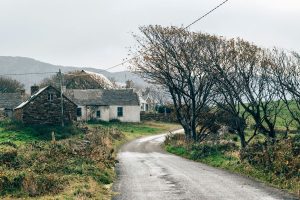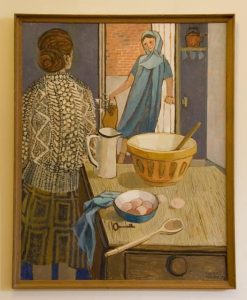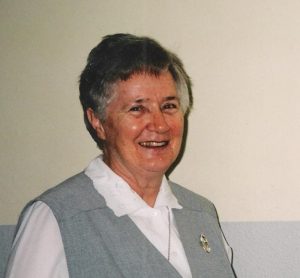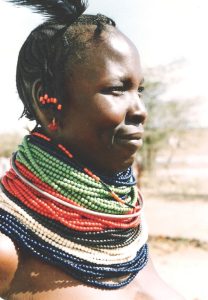by Sr. Margaret Anne Meyer MMM U.S.A. 21.08.2024
 Christmas was soon approaching, and the completion of my six months medical internship was in sight. This was to be my first celebration of Christmas in Drogheda at the Motherhouse and the surrounding joy was palpable. I never saw so many cribs placed in every available nook and cranny. They were delightful to behold. The hospital, as I now remember, seemed to be quiet without too many emergencies, all lending itself to the quiet entrance of our Infant Savior at Midnight Mass. I had never celebrated Christmas with so many MMMs before and it was a real treat for me.
Christmas was soon approaching, and the completion of my six months medical internship was in sight. This was to be my first celebration of Christmas in Drogheda at the Motherhouse and the surrounding joy was palpable. I never saw so many cribs placed in every available nook and cranny. They were delightful to behold. The hospital, as I now remember, seemed to be quiet without too many emergencies, all lending itself to the quiet entrance of our Infant Savior at Midnight Mass. I had never celebrated Christmas with so many MMMs before and it was a real treat for me.
A few days later, on Holy Innocents Day, a party was held in the library, now part of the Our Lady of Lourdes Hospital. What I remember to be the thrill of the party was to see one of the popular nursing students dressed in an MMM HABIT. There was great exclamation and then a few minutes later Mother Mary entered the room, and all eyes fell on her. She sang her favorite song for us “All on a Summer’s Day.” I have tried to look up the song on Google but I did not see it. I found it so entrancing that the memory, melody, and some words of the song have etched themselves on my heart. “I kissed her once. I kissed her twice and then I stole away. You may think this funny; but she had no money. All on a summer’s day.”
I had grown close to the medical patients with chronic diseases who were long term admissions to the hospital or came for follow up visits to the outpatient’s department. One man in particular was a tall, good looking, well-built farmer with lymphoma. At that time there was a limited source of chemotherapy, and I could see him gradually decline. Somehow, I kept track on him, and he died a few months later. May God rest his soul.
Yes, the first of January was the date of handing over and taking up a new field of medicine. I was assigned to work under Doctor Connolly and Doctor O’Brien as an intern. I found being with the miracle of new life exhilarating. The women delivered their babies with true valor, and I loved witnessing their happiness when it was over, and they were holding their cherished babies in their arms. Sometimes the outcome was not as joyful and then we would join their pain. The midwives did an excellent job with helping the women deliver their babies and alerting the Doctors if an abnormality arose.
Overall, I loved the experience of watching the women attend their antenatal care and watch them carefully for any abnormality in their pregnancy. Dr. Connolly taught us well that pregnancy should be a joyful time of expectation in a mother’s life, and we should do all we could to ensure her baby and herself were healthy. At that particular time some women had anemia, and the flying squad would be called to bring them to the Maternity if they showed any sign of bleeding or other disorders. Sr Briege Breslin and I were called many a night to help a woman who had a miscarriage.
I loved to examine the newborns to look for a heart murmur or congenital hip dislocation. Thank God these were quite rare. One of the biggest problems at that time was delivering a baby whose mother was Rhesus Negative. The serum to correct this had not been invented yet and the babies needed exchange transfusions. Thank God we had a very well-run neonatal unit on the ground floor of the Maternity hospital which was located where Aras Mhuire Nursing Home is now. It was the original hospital before the IMTH was built and opened in 1956. Each ward had a special MMM Sister, or lay nurse/midwife assigned. I loved working with these dedicated women who had so many years of experience and taught me very much in their quiet and efficient way of handling difficult situations.
by Sr. Sheila Campbell MMM Ireland 18.08.2024
 I come from Belfast in Northern Ireland. But like so many of the people of my age, seventy-plus, the original family home is long gone. What makes home for us initially is where we were brought up, where we lived with our parents.
I come from Belfast in Northern Ireland. But like so many of the people of my age, seventy-plus, the original family home is long gone. What makes home for us initially is where we were brought up, where we lived with our parents.
Now that my parents are dead and my brothers and sisters scattered around the globe, the question has often surfaced for me “where is home?” MMM life is not conducive to “nest-building”. We have a saying that Mary went in haste to visit her cousin, Elizabeth, in the Gospel, and when Mother Mary took the Visitation as an inspiration, we have been “going in haste” ever since! Certainly, when we go to a new mission, we know that we will be there for a certain period of time but must always be ready to move on when the need is greater elsewhere.
And yet the question continues. We all need a “home”. Home is the place of security, the place where we can be ourselves without pretence or fear. We are known and are accepted as “belonging”. All this is important for our development and our functioning as adults in the wider society. So, what happens when the old “physical” home disappears. Either we resolve the issue by establishing a new home, as many young couples do when they marry, or as in my case, as a religious sister, we establish “home places”.
For me these are places/situations where I have felt free, able to be myself and feel that warm acceptance. As I am writing, three places stand out for me. The first is County Donegal where I had many early holidays and Irish language learning experiences. I feel a freedom in the wildness of the landscape and yet the home feeling in chatting to the local people who are “The salt of the earth”. The second “home place” was a convent in upstate New York where I spent a year in a rest and renewal experience in my early 40s. I was totally “burnt out”, and the love and care I received from the Sparkhill Dominican Sisters there put me back on my feet, and that love has stretched out to me over the years. The third “home place” is Brazil. I began my Brazilian life when I was 27 years old and left it when I was 68. I began in the southeast and ended in the northeast. But just each time I landed back in the airport I knew I was coming home.
Isn’t it great to have “home places” that we can treasure in our hearts, no matter where we are in the world! I encourage you to think about your own!
By Rev. Canon Susanna Gunner England 15.08.2024
Image by Claudia Williams
 One afternoon last summer, on retreat at St Beuno’s in Wales, I took myself to a little sitting room to do some reading. But my eye was immediately drawn from the page on my lap to a painting hanging above the fireplace. I was alone in the room so I wriggled a chair right in front of it and looked and looked…
One afternoon last summer, on retreat at St Beuno’s in Wales, I took myself to a little sitting room to do some reading. But my eye was immediately drawn from the page on my lap to a painting hanging above the fireplace. I was alone in the room so I wriggled a chair right in front of it and looked and looked…
I realised that whoever the painter was had whisked me into a moment between two first century women, a moment of monumental import (Luke 1.39-56). Mary, wearing a maternity dress in the blue of heaven, has just opened the door into Elizabeth’s homely kitchen. She is the bearer not only of divine news but also of a divine child and, desperate to share all this with her cousin, has not waited for her knock to be answered. A scarf in exactly the same blue is draped on the kitchen table. What does this signify? That Elizabeth is ready and waiting to respond to the heavenly child Mary carries? That they will soon be talking about the powerful connection they feel between the child in Mary’s womb and the one in Elizabeth’s?
Mary stands in the doorway of Elizabeth’s home with a few gleaming-white lilies in her bag and a loving smile on her face. It feels as if the painter (who I now know to be Claudia Williams b.1933) is taking us with those lilies on a journey. So often they feature when, by artists down the ages, Gabriel is depicted giving his message to Mary about her extraordinary pregnancy, classic symbols of her purity and innocent vulnerability. Williams has imagined Mary packing up the flowers and taking them with her to the hill country where Elizabeth lives, thereby reminding us of Mary’s recent encounter with the angel and creating a flowery link between Annunciation and Visitation.
But there are other links too… Just as many classic Annunciation scenes indicate the divide between earth and heaven but also that in this encounter that divide has somehow been transcended, so here in this Visitation scene, Elizabeth’s kitchen stands open to Mary who is literally on the threshold, in a liminal space pregnant with possibility, at one and the same time in and of the world and bearing its Creator.
And then there are all those geometric shapes and patterns – in the brickwork behind Mary, in the stripes on the door which she’s just opened, in the square block design of Elizabeth’s skirt and the cable patterns of her knitted jumper, in the grain of the wooden table top. Again, this geometric feature sometimes pops up in annunciation scenes. Look, for example, at Botticelli’s (1481), Eric Gill’s (c.1912) and Dinah Roe Kendall’s (2005). What might all those repeated shapes be saying? Perhaps that the Creator whose universe is suffused with the most beautiful pattern and proportion is also at the very heart of this encounter and everything to which it will lead, purposefully conceiving a new order, utterly in control. Claudia Williams brings those same ideas into Mary’s visit to Elizabeth, making the point that this moment too is an essential one in the revealing of God’s plan.
Elizabeth looks toward Mary in greeting, her age subtly indicated by her clothing and rounded shoulders. She turns from her work at the table, calmly open to the girl on her doorstep. Dare I let Mary and her child into my kitchen too? Is my blue scarf of response ready and waiting? What will leap inside me when they are near? And what is already lying within me waiting to be birthed by God?
The key lying on the table is there for a reason. It is, I think, a signal from the artist that this moment holds the secret to a very significant unlocking – not just of the meaning of those two babies in utero and to the relationship which will emerge between them, but also to an unlocking of us, when we like Elizabeth, are involuntarily stirred by the presence of Jesus.
We know it will not be easy for either of these women (both their little boys will be put to death as young men), and perhaps the small parts we ourselves might play in the unfolding of God’s beautiful pattern will be testing for us, yet the painting holds up a resilient, determined lens to expectancy, hope, newness. And those foregrounded, unmissable eggs speak not just of birth, of course, but of resurrection, of re-birth, of a divine transformative process which cannot be halted by rejection and death and loss.
by Sr. Una Ni Riain MMM (1931-2022) Ireland 13.08.2024
 The road was bad, full of potholes, so the traffic was moving slowly. She was lying on the other side of the road, in the way of the on-coming traffic, and all the cars weaved their way delicately around her so as not to hit her, just as they had avoided the potholes.
The road was bad, full of potholes, so the traffic was moving slowly. She was lying on the other side of the road, in the way of the on-coming traffic, and all the cars weaved their way delicately around her so as not to hit her, just as they had avoided the potholes.
Was she dead? An accident? No, as the people stop when there is an accident and bring the injured person to the hospital. Mad? A beggar? Yes, that was probably it. In the tropics the grass grows long and wet to the edges of the road. It is full of ants and insects and snakes, no one could sleep in it. And so, the destitute often sleep on the road. After all, the road is warm from the sun. We continued our journey, but with a certain uneasiness.
Three hours later, on our return journey she was still there, lying just as she had been. Cars and motorcycles were still passing her by, pedestrians scarcely glanced at her, but this time we stopped to investigate. It was now midday, and the tropical sun was beating down with full intensity on the tarmacadam road.
We lifted the unconscious figure of a woman off the road and put her lying in the back of the car. We did not feel like good Samaritans. We were very much ashamed. Her dress was wet as we lifted her. Perhaps she was an epileptic? I noticed a group of young men standing at the other side of the road, laughing as they watched us. Fools for Christ? We took her to the hospital where the nurses received us with kindness and attended to her.
I was pleased to find she was admitted to the ward where I myself was on duty. I looked at her chart:
Name: ?
Address: unknown
Nearest Relative: Sr. Una! I was strangely delighted to be named the nearest relative to this destitute person.
She had a fracture of her thigh bone, blistered legs from the heat of the sun, pressure sores and an abscess on her buttock. I soon learnt that she had been lying on the road for four days!
Slowly she regained consciousness, and she told me her story. Julia was a leper and had been treated in the Leprosy Settlement twenty miles away, but was no longer infectious. She was old, and she wanted to die at home. She set off for home. But they would not receive her, and she took to begging. One evening she took courage, and instead of sleeping on the road, she went back to her compound. Perhaps they would let her sleep there at least.
But they were afraid. Afraid that she would bring the sickness to themselves or to their children. And they beat her and drover her away. It was during this beating that her leg was broken. She dragged herself along the streets, still begging, until she finally collapsed two days later. She told me all this without anger, bitterness or blame. Well, a ‘nearest relative’ has obligations, and so I brought her some simple requirements, soap, a sponge, towels and a spoon to eat her food. Her gratitude filled me with confusion and shame. So much gratitude for so very little, and no blame for anyone.
Within a few days I had to go on a journey. Who would care for her? We arranged for her to return to the Leprosy Settlement, where everyone was equal. Those who care for the patients are not afraid of the dread disease. On my return a week later, a letter awaited me. The nurse in the Settlement wrote telling me Julia had died two days after her arrival.
The Qua-lboe (Presbyterian) Leprosy Settlement where Julia is buried had welcomed her back. They prayed with her, and she died with dignity and comfort. I was grateful to be involved with another Church in the care of the most abandoned of human beings.
Julia, I am grateful you will be there when mu own hour comes. Don’t forget a word for the ‘not-so-good’ Samaritans who delayed their help until the return journey.
First Published by MMM in 1983 when Sr. Una was in Nigeria.
by Nadia Ramoutar MMM Communications Coordinator Ireland 11.08.2024
 There is a darkness going on in the world which benefits from us ignoring it. Some things going on far from us that when revealed, disgrace our humanity. There was an article recently about a coalition of Sisters working to correct human trafficking in Sri Lanka. The Global Sisters Report does a wonderful job of giving updates on what is going on in the world that might not make the main media. Within the article the statistic was revealed that about 27 Million people are being human trafficked in our world at the moment. When we pause and think about this, that is more people than the population of most countries. What would we call that nation?
There is a darkness going on in the world which benefits from us ignoring it. Some things going on far from us that when revealed, disgrace our humanity. There was an article recently about a coalition of Sisters working to correct human trafficking in Sri Lanka. The Global Sisters Report does a wonderful job of giving updates on what is going on in the world that might not make the main media. Within the article the statistic was revealed that about 27 Million people are being human trafficked in our world at the moment. When we pause and think about this, that is more people than the population of most countries. What would we call that nation?
For those of us living in the comfort of a loving home or community, such a number is hard to fathom. How can it be that our world which claims to have rid itself of slavery has just rebranded it? Of those trafficked, 70% are female, often very young girls who will end up working in the sex trade for life. Our MMM Sisters are involved in efforts to end this trend but there is so much more to do. I saw the efforts in Tanzania and met children prey to this atrocity.
Faced with overwhelming human failings, I think about ways to make it better. I also turn to other writers who transcend the horrors of the world in an attempt to reset our behaviours. Thomas Berry is often of great comfort to me. Berry many of you will already know, was a profound humanitarian and Christian. He questioned the role of the human community in the world, inspiring us to do better in order to respond to the ecological and social challenges we face. He lived through two World Wars and I think he saw that the future of human creation was not looking stellar. But, he also held onto a cosmic vision of a better world.
Thomas eloquently lifted humans up to a higher standard imploring us to have a more harmonious relationship with our earth and with one another. He was concerned with our consciousness and implored us to be too. Is this where we are going wrong? Are we planting the wrong seeds?
What would it take for humanity to become more conscious to where buying a girl for sex is deplorable to all of us? Could the sex trade die from no customers? The tourism sex trade and the millions of mostly men who keep it alive, I know are among us. Can we somehow create a more loving Christian consciousness where there is no market that is willing to trade in the souls of children for a few minutes of what? I don’t even know what to call what someone gets from this. Let’s carry on the legacy Berry created and rewrite this disgrace to let human trafficking be replaced by something much more beautiful.
by Mary Essiet Nigeria 09.08.2024
 I like to think that traveling light is one of the steps in journeying through life smoothly. By this, I mean just living in the moment and taking it a step at a time. It costs little or nothing when compared to overthinking, which robs one of real-time happiness.
I like to think that traveling light is one of the steps in journeying through life smoothly. By this, I mean just living in the moment and taking it a step at a time. It costs little or nothing when compared to overthinking, which robs one of real-time happiness.
I would say that when trials and temptations arise, one should trust in God and his provision. However, having been there, I realized that it just does not work like that. There are things that overthinking does to a person. It overwhelms you with fear of trying new things, worry about past actions and ultimately keeps you fixated at that point. It steals away the joy of basking in the moment. It cripples you while robbing you of peace. It is a stressor!
Not once or twice have I found myself overthinking, and in response I tried to deceive myself by praying. Maybe it was not a deceit after all, but I know that I could not even communicate effectively with God. Somehow, I felt he was too far away from me, but then I remembered my community of friends. They are the ones whose back I could always ride on until that phase elapses and I can find my feet once again. So, I grabbed the opportunity.
In my experience, community(friends) plays various roles in one’s journey of faith, and our relationship with others has a way of deepening our understanding of God’s abundant love and presence.
Every day, I remind myself that life itself is full of ups and downs, and I must consciously free myself from the chains of overthinking. I cannot be present or enjoy the peace I have at hand if all I think about is “WHAT IF?”. So, I make sure to repack my travel bags from time to time, ensuring that there are no traces of this joy killer but only essential needs. It’s been fruitful, and I hope people can do that too.
by Sr. Sheila Campbell MMM Ireland 07.08.2024

Nowadays we hear about the big wars in Europe and the Middle East, as if these were the only places where conflict exists in our world. Here is a story typical of many situations MMM face in their daily lives. It was on March 5th a few years back, around 7am, gunshots were heard. The people started running towards the church in Nakwamoro, Kenya. The sound of shooting, which came from three directions, continued for four and a half hours unabated. Nobody moved.
The battle took place at the Turkwell River. MMM had been in the area for over 30 years when they were welcomed during a severe famine. Tribal conflict between the Turkana people and the neighbouring Pokot people was common. The relationship between these two warring tribes had always been aggravated by constant raiding of each other’s herds.
For a couple of years previously, relative peace prevailed and both tribes brought their animals for grazing and watering to the Turkwell River.
Suddenly the Pokots disappeared. This raised an air of suspicion.
At 11.0am the first wounded man walked into the Health Centre. The local priest drove down to the river. Fourteen Pokots had been killed. Many were wounded. Six severely wounded men were carried in for treatment. It took three and a half hours for the staff at the Health Centre to treat their horrific gunshot wounds.
The Army arrived at 5pm. They had been detained in another part of the district where this raid at started at 4am. In the other area they had found thirty women and children who had been killed in their homes.
The following morning the wounded on stretchers were carried across the Turkwell river – for onward transportation to the District Hospital in Lodwar, a three-hour journey.
Ater the raid, people were too nervous to sleep in their own homes. They spent the night close to the church and Health Centre. They were even afraid to attend to their small vegetable plots in the daytime. Anyone who could move away from the area left.
Conflicts like these used to be carried out with clubs, bows and arrows, and spears, but the availability of guns has now resulted in more deaths and more serious injuries.
The MMM Sisters had no time to think of what was happening until it was all over. They were just grateful it happened in daylight, not at night. They were glad to be there to provide assistance and support. But the future? Just constant warring? …
by Sr. Phyllis Heaney MMM (1937 – 2019) Ireland 05.08.2024
Killybegs, a small town in Co. Donegal, has a special place in the heart of many senior MMM Sisters as being their holiday home for many years. Sr. Phyllis tells of her time there as one of the permanent staff.
 Just after my First Profession in May 1963, I was missioned to Killybegs to help Sr. Perpetua Kelly in caring for the retired and elderly Bishop B. McGinley and running “Bruach na Mara” which was our holiday house. At that time Killybegs was a beautiful little fishing village nestled in the hills of Donegal. It was made up of the old harbour (near the sanatorium) and the new harbour, which was a hum of activity with Donegal and Kerry fishermen. There were also boat builders and little shops spread around the cosy village with the church on the hill overlooking it all. The doctor there was Dr. Clarke, a brother of our own Sr. Monica Clarke. This was to be my village for almost six very happy years.
Just after my First Profession in May 1963, I was missioned to Killybegs to help Sr. Perpetua Kelly in caring for the retired and elderly Bishop B. McGinley and running “Bruach na Mara” which was our holiday house. At that time Killybegs was a beautiful little fishing village nestled in the hills of Donegal. It was made up of the old harbour (near the sanatorium) and the new harbour, which was a hum of activity with Donegal and Kerry fishermen. There were also boat builders and little shops spread around the cosy village with the church on the hill overlooking it all. The doctor there was Dr. Clarke, a brother of our own Sr. Monica Clarke. This was to be my village for almost six very happy years.
On arrival, I received a great welcome from Sr. Perpetua and His Lordship, the Bishop. The Bishop had been the first Bishop of Manila in the Philippines, and later Bishop of Monteroy-Fresno in California, which was to become his last resting place. The house in Killybegs was built for him by his family and it became his residence when he retired there for health reasons in the early 1960s. As well as being in poor health, the Bishop was blind. He gave the house to MMM in return for our undertaking to take care of him. It was a beautiful, spacious building and a haven of tranquillity. It was situated off the main road, overlooking the harbour, and was an ideal place for an MMM holiday house.
Sr. Perpetua was the Bishop’s “eyes” as well as his carer. She was one of the Sisters who was such an inspiration to me; her sense of God’s call for her, her dedication to her mission, her prayer life, her devotion to the Blessed Sacrament, her love of the Mass, her care for the people, especially the poor. Then she got me as her helper. I had good experience in cooking and from my own home I had learned to be a good housekeeper, all of which helped in the smooth running of the house. We worked well together and lived happily. I thank God for her part in the early part of my MMM life.
Sr. Perpetua and I shared many a laugh about amusing moments. She was very well kniwn in the village, she prayed for all the intentions and kept an eye out for the poor. She provided an easy entry for me into the lives of so many people. I used to bring the letters to the Post Office every afternoon at 3.30pm, so it was an opportunity to be in the village and to meet the local people. It was there I had one of my first meetings with a person with a handicap as a result of polio. I also met families with various problems, so this increased my sensitivity to those around me and stirred me to be a presence of His loving care. We had many friends among the fishermen and were supplied with fresh fish almost every day, free of charge.
During my time there, Killybegs grew and grew as the harbour was developed. We joined in the excitement when the first radar fishing boat came into the harbour. We shared in the joy of the people as boat builders got busy with more and more work, and when the new shop and even a supermarket appeared. There was also the pain of loss when there was an accident at sea and local men drowned.
“Bruach na Mara” which means “The Edge of the Ocean”. Killybegs, was opened as an MMM Holliday house in 1952 and was closed in 1972.Because of it, Killybegs will always be special to me.
First Published by MMM in 1953
by Sr. Patricia Kelly MMM (1925 – 2016) Ireland/Nigeria 03.08.2024
 Countless inquiries regarding our health and diet reach us regularly from loved ones at home. They never tire of asking, “What is the food like? Do you ever see a rasher? And “Can the cooks make potato-cakes?” So, I have decided to expound on the glories of palm oil chop. For us, missionaries in Calabar Province, it takes the place of the Sunday roast, and after the week’s rations of corned beef from tins, palm oil chop has the savour of better days about it.
Countless inquiries regarding our health and diet reach us regularly from loved ones at home. They never tire of asking, “What is the food like? Do you ever see a rasher? And “Can the cooks make potato-cakes?” So, I have decided to expound on the glories of palm oil chop. For us, missionaries in Calabar Province, it takes the place of the Sunday roast, and after the week’s rations of corned beef from tins, palm oil chop has the savour of better days about it.
Let’s begin at the name, as it needs some explanation. In Nigeria “to chop” is the verb “to eat”. No local cook says, “It is breakfast time or dinner time,” he just says, “It is chop time.” Palm oil is obtained from the kernels of the palm fruit, which are as plentiful here as apples are at home. This oil is one of the country’s main sources of income and traditionally it is the woman’s duty to crush the kernels and extract the oil. So much for preliminaries, now we get down to our Sunday chop.
Sunday out here is a day of rest observed with almost Jewish strictness. “No School” and “No Dispensary” – except for the urgent cases, and the babies who have a habit of arriving at unwanted hours in every country and in every climate. We plan an early siesta and hope in Providence that things will go according to schedule.
At 1.00pm the dinner table looks like the window in a confectioner’s shop. Any number, up to sixteen, small bowls or saucers, each holding a special ingredient, adorn the table. There is sliced bananas in one, pineapple in another, orange in another, ground nuts, red pepper, hard boiled eggs, coconut one dry yam, each in separate bowls, and last, but not least, the palm oil with the chicken which has been cooked in it. The novice in the country is warned by a kind neighbour to go easy with the red pepper, and each one’s soup plate – used for this menu – presents a riot of colour.
The palm oil bowl is passed last. No need to carve up the chicken as the chicken is literally mincemeat, and as one dips the ladle he hopes, like the fisherman, to bring up catch. No use to say as of old,” I want the breast, and I don’t like the drumstick.” Everyone has to be satisfied with his takings. The golden coloured palm oil and the piece of chicken is now added to one’s plate and all the ingredients are mixed. It sounds terrible, but after the first taste, one is converted to palm oil chop forever.
Let enthusiasts abroad wish to taste our Sunday dinner I shall give this warning. Without palm oil, it is a meal fit for my mother’s pet rooster, but with palm oil, it is a feast.
by Nadia Ramoutar MMM Communications Coordinator Ireland 01.08.2024
 As a young girl growing up in Ireland, I somehow got the idea that being an adult was an arrival point, like a destination lounge in an airport. You became an adult and then you had the freedom to create whatever life you wanted. Along with this fallacy, I also believed that good things happened to good people. The idea of suffering was not one that I thought would be part of my older years. Little did I know how much of a role suffering plays in the adult – and often child world plays. As we look around our world today, we can see so much suffering that we can question our faith. But, perhaps the reverse should be true.
As a young girl growing up in Ireland, I somehow got the idea that being an adult was an arrival point, like a destination lounge in an airport. You became an adult and then you had the freedom to create whatever life you wanted. Along with this fallacy, I also believed that good things happened to good people. The idea of suffering was not one that I thought would be part of my older years. Little did I know how much of a role suffering plays in the adult – and often child world plays. As we look around our world today, we can see so much suffering that we can question our faith. But, perhaps the reverse should be true.
Part of what I also did not understand was that suffering too, has it’s purpose. Suffering is a valuable teacher and it is a way for us to grow and to become stronger. I have found now that where there is suffering in our world or in our own lives there is an opening for things to be better than they are now. Even suffering brings gifts to the faithful. We just have be patient when things don’t go our way. Hold on.
Rather than seeking a life that is easy and comfortable all the time, we can look at places in the world when things are going poorly and reverse the question. What can we do to bring mercy and grace to those who suffer, including to ourselves? Some people suggest that it is in Romans that we can see how faith and practice come together in ways to live as Christians.
“…We also glory in our sufferings, because we know that suffering produces perseverance; perseverance, character; and character, hope” (Romans 5:3-4, NIV).
Perseverance is such a loaded word in so many ways because it implies patience over time. It gives us a sense that it is a grasping at patience and not letting go of it. Often time our work in global health and justice can seem overly layered in suffering. It feels as if we won’t be able to overcome the magnitude of the problems and challenges faced. But with perseverance, hope again emerges and our character is positively impacted by its presence.
Faith is really tested when things become challenging. It is easy to be faithful when life goes our way, but when it does not then we cannot just shrug and give up. We have to then find out what our true character really is. We can see that it is in suffering we learn who we are and we have a choice then to persevere or perish. At times like this, we can also be role models to other people as they see us growing faced with challenges rather than falling apart. Keeping other people calm and being clear and focused can serve us better than any worrying when times are hard.
